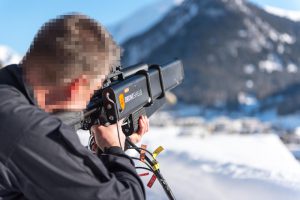
“While drones themselves are a market, drone detection and countermeasure is the emerging market and that’s the one we’re in,” James said in a recent interview on 2GB/873 AM’s Sydney Live.
James said that, while drones offer many positive benefits, rogue users are causing disruptions and even creating life-threatening dangers. In addition to reports of ISIS strapping explosives to consumer drones, incidents involving airport dangers and prison violations are on the rise.
“Prison walls are made for keeping bad people in,” James said. “They are not particularly made for keeping drones out,” noting that some prisoners use rogue drones to deliver contraband – drugs or weapons – inside the walls.
James highlighted recent developments with his company’s DroneGun device. The “gun” is a signal-killing device that can take control of errant drones and block video signals to UAV cameras. James noted the Mark III-model gun is generally for military/police use and, despite the name, is not a gun for shooting down drones.
“[DroneGun detects] the drone — we know the broad direction where it is. Using radio frequencies, the drone gun will send a signal out take control of the drone and then bring it in – it’s quite fascinating to see. The drone will disable the video and then land it [at the operator’s] feet,” James said.
Last month, the “gun” was certified as compliant for human exposure pursuant to requests by potential governmental end-users, in relation to their procurement processes.
In addition to bringing the drone to a DroneGun user’s feet, the device can also send rogue UAVs back to the offender, capturing their GPS coordinates.
“[In the case of a prison mission], you want to see who gets it,” James said.
James noted a marked increase in the company’s products by several government agencies worldwide: Paraguay, South Korea and back home in Australia, as well as requests from several North American and European prospects.
In addition to DroneGun, the company offers other solutions. DroneSentinel is a multi-prone detection product designed to locate rogue drones. DroneSentry detects and neutralizes unmanned aerial bandits using jamming technology. In November, DroneShield demonstrated both for governmental end-users at its Virginia office.
Currently, DroneShield provides detection coverage for the Boston Marathon. The company also scored a major European victory last year, protecting the Davos Economic Forum in Switzerland.
While DroneShield’s major client base focuses on military/police applications, James envisions a future where drone mitigation will address community privacy concerns.
“In most parts of the world, drones are considered to be commercial vehicles and have many protections a plane has. You just can’t go and shoot them down. You can get yourself in a lot of strife,” he said, adding that legislation will likely catch up to address privacy issues. Currently, non-governmental users cannot deploy DroneGun.
Jason is a longstanding contributor to DroneLife with an avid interest in all things tech. He focuses on anti-drone technologies and the public safety sector; police, fire, and search and rescue.
Beginning his career as a journalist in 1996, Jason has since written and edited thousands of engaging news articles, blog posts, press releases and online content.
Email Jason
TWITTER:@JasonPReagan
Subscribe to DroneLife here.